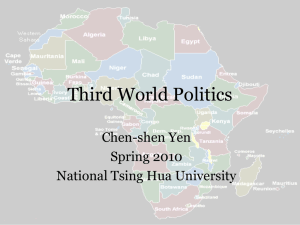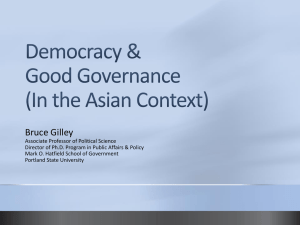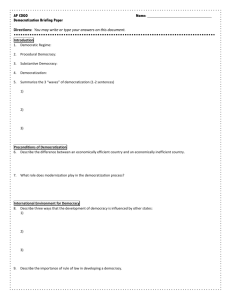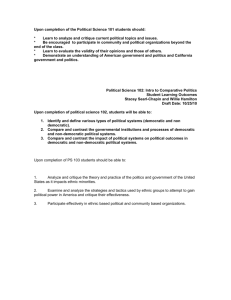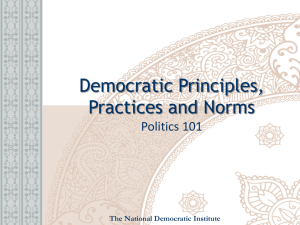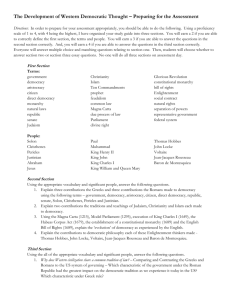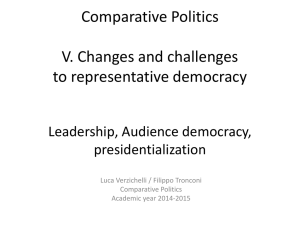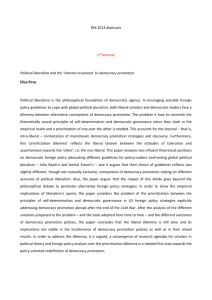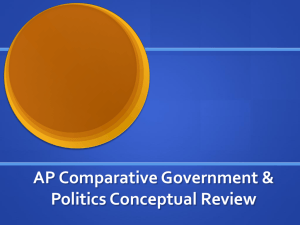Notes by Panel Chair Bernard Wood
advertisement
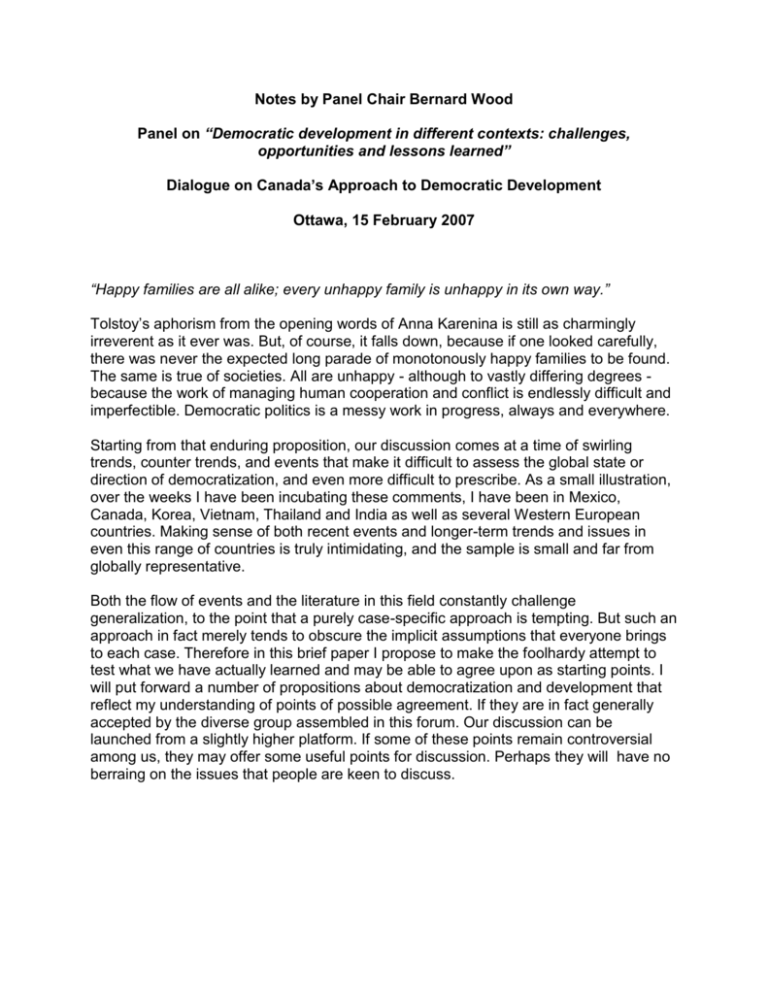
Notes by Panel Chair Bernard Wood Panel on “Democratic development in different contexts: challenges, opportunities and lessons learned” Dialogue on Canada’s Approach to Democratic Development Ottawa, 15 February 2007 “Happy families are all alike; every unhappy family is unhappy in its own way.” Tolstoy’s aphorism from the opening words of Anna Karenina is still as charmingly irreverent as it ever was. But, of course, it falls down, because if one looked carefully, there was never the expected long parade of monotonously happy families to be found. The same is true of societies. All are unhappy - although to vastly differing degrees because the work of managing human cooperation and conflict is endlessly difficult and imperfectible. Democratic politics is a messy work in progress, always and everywhere. Starting from that enduring proposition, our discussion comes at a time of swirling trends, counter trends, and events that make it difficult to assess the global state or direction of democratization, and even more difficult to prescribe. As a small illustration, over the weeks I have been incubating these comments, I have been in Mexico, Canada, Korea, Vietnam, Thailand and India as well as several Western European countries. Making sense of both recent events and longer-term trends and issues in even this range of countries is truly intimidating, and the sample is small and far from globally representative. Both the flow of events and the literature in this field constantly challenge generalization, to the point that a purely case-specific approach is tempting. But such an approach in fact merely tends to obscure the implicit assumptions that everyone brings to each case. Therefore in this brief paper I propose to make the foolhardy attempt to test what we have actually learned and may be able to agree upon as starting points. I will put forward a number of propositions about democratization and development that reflect my understanding of points of possible agreement. If they are in fact generally accepted by the diverse group assembled in this forum. Our discussion can be launched from a slightly higher platform. If some of these points remain controversial among us, they may offer some useful points for discussion. Perhaps they will have no berraing on the issues that people are keen to discuss. As an opening point, I will mildly criticize the sequencing of our panels, beginning with the record of international democracy promotion, and then coming to our discussion of countries in different situations. The basis for my criticism is my first proposition: 1. Too much of the writing, thinking and attempts to promote the linkages between democracy and development has focused on the perspectives and efforts of the industrialized countries, and particularly of the United States. My criticism of the agenda is a mild one, because I trust that our sister panel will already have begun to redress some of these imbalances, and that our panel will anyway have the further chance to do so if required. Having stressed that this discussion should not be “all about us” in the industrialized countries, I will briefly recount some direct, and I think instructive, experience from my involvement with the early efforts of the donor countries collectively to come to grips with the interfaces between governance and development cooperation. In the early 1990s, as the aid donors began debating these linkages, I was heading the secretariat of the OECD DAC, the forum of donors - all established democracies where these debates took place. They were vigorous and complex debates. Most member-countries were distinctly uncomfortable with too-activist an approach to the political dimensions of development, and some with any explicit an approach at all. Some were very concerned with what they saw as ideological and culturally-insensitive undertones of the advocacy - we need only recall the ferocious “Asian values” debates of the time. Meanwhile, still others were acutely sensitive to recent and recurring instances of glaring gaps between pro-democratic rhetoric and ruthless realpolitik in the behavior of a number of major donor countries. Some were insistent on starting from the base of internationally-enshrined human rights, others pressed l’etat de droit as the starting-point, while the ends of the spectrum saw forceful advocates of liberal democracy ranged against those of “political non-interventionism.” Crudely simplified notions of “conditionality on aid” further complicated the picture. Working by consensus among 22 member-countries, we had to struggle to get any mandate to pursue this work, and when we did, it had to navigate very carefully and skillfully through the minefields of our members’ strongly-held differences to arrive at the DAC Orientations on Participatory Development and Good Governance in 1995 and further work in 1997, and a succession of further products after that. Human rights, participatory development and good governance were the best entry-points, the first because of their established universal legitimacy, and the latter two because of their indisputable connection to performance in economic and social development. One criticism sometimes made was that the “participatory development/good governance” approach was something of a “cop-out,” attempting to treat ultimately political issues as a set of administrative or technical challenges. There may have been elements of truth to this at time, but there is no question that it has provided a basis for 2 impressive forward movement by the whole international community, in policy and action. It must also be said that one key to the way ahead, among these seasoned aid practitioners and diplomats from the Western democracies, was always to challenge and strip away slogans - which tended to overblown rhetoric and missionary zeal – and probe always for the functional elements of development at work. The term “democracy” was used, but sparingly, and its use was always carefully measured. By 2006, we have reached a point where the UK Government has compellingly hinged its whole new White Paper on Development and Development Cooperation on the Governance linkage to development and poverty reduction, African Governments are submitting themselves to peer review of governance and other aspects of performance, and the whole international community is pushing further into the neuralgic issues of corruption than would have been thought possible a decade ago, as well as working constructively on the full range of other governance questions. My second proposition flows in part from this brief history. 2. For once and for all, it is important to get beyond “sectarian” arguments and build a synthesis of approach and strategies to advance economic and social development and democracy in tandem. The disputes between the “development community” and the “democracy community,” or between champions of electoral assistance, human rights, or strengthening the rule of law are, like most such schisms, completely mystifying to non-adherents to any of the sects, who rightly see all of them as extremely close in their basic aims. The evident fact is that all these elements need to come together and reinforce each other, with their combinations and sequences dependent on particular situations. While Amartya Sen, in dismissing the old question of whether countries were “fit for democracy,” may have overstated the case that they will become “fit through democracy” there is ample evidence that these pillars can reinforce each other powerfully. Presumably it is a key part of the vision and mission of the Democracy Council of Canada to build these bridges in Canadian efforts, and we must hope that it succeeds. 3. The essential attributes of democratic governance have in effect become a universal expectation and yardstick. Under appropriate conditions and barring further monstrous blunders, contrary interpretations of “Muslim values” or other bases for exceptionalism to this standard can be overcome by appropriate experience and adaptation, as is happening with the “Asian values” argument. However, it is sobering to note that it probably took the shock of the Asian financial crisis of the late 1990s to give a real foothold to these standards of transparency and accountability in a good number of East and Southeast Asian countries. 4. Sponsorship and history matter. The concrete example of freedoms in Western countries is a far more effective propagator of democratization than any amount of pressure or missionary activity by these countries. Aggressive advocacy can in fact be counter-productive, stirring resistance and re-kindling memories of past and recent 3 inconsistencies by the West. Even responsive assistance in these areas requires great discretion and sensitivity. 5. Elections and formal institutions are not enough. While technical and formal institutional arrangements can make important contributions to effective democratization, they must be underpinned by the spread and absorption of democratic civic values (e.g. of constitutionalism, citizenship and participation, probity and accountability) and attuned to political realities. 6. Sustainable democratization requires parallel progress on expanding equity and opportunity, as well as participation, to give all a sufficient stake in the democratic project. The failure to deliver tangible benefits and opportunities to widening numbers, together with glaring or growing disparities, can lead to loss of trust in democratic politics and/or the election of demagogues prepared to sweep aside constitutional processes and guarantees. As Plutarch wrote, “An imbalance between the rich and poor is the oldest and most fatal ailment of all republics.” 7. Limits on the scope and role of the State are essential to sustaining democratic politics. Quite independent of the efficiency and other arguments for a market economy and circumscribed roles of the State, experience has shown the need to carefully insulate wide areas of individual and community life from the domain of political intervention and decision. Where such limits have not been recognized and protected, politics has too often becomes a “winner takes all” contest in which opposition is delegitimized and the livelihoods and very lives of defeated politicians are at stake, with the logical consequence that they will do virtually anything to avoid defeat. One related proposition relates to the growing understanding of the healthy discipline of taxation as a part of a “social contract” that must be negotiated between the State and citizens and interest groups, in the process often strengthening both their ownership and the accountability of the governors. The dangers of resources coming into the hands of governments without such disciplines – often resource rents and, under some conditions, foreign aid – are increasingly being recognized. 8. Healthy democratic politics are not utopian, but anti-utopian. Never forgetting that the utopians of the twentieth century were its leading totalitarians and mass murderers, it is important to keep in mind that the paradoxical nobility of democratic politics is its ability to encompass and accommodate imperfect human beings and societies. Democratisation must by definition be an enormously long, complex and often seemingly chaotic historical evolution. As Bernard Crick, the British MP and political scientist, long ago demonstrated, a functioning democracy is an eternal bazaar of different values and interests, never entirely secure from human vices, but ultimately bounded by some conception of civic virtues. 4 It is hoped that these scene-setting remarks by the chair may do something to help launch the panel discussion and to start mining the deep and diverse experience of the eminent panelists. But we most look forward to the reflections of the panelists themselves, covering a wide array of countries facing different types of challenges, and from their personal experience, sometimes on the very front lines. Taking into account the discussion in the earlier panel on international involvement, the panelists will be asked to offer several key reflections or lessons for Canada. Finally, almost any aspect of these topics can rapidly become controversial, often passionately so. No matter how careful a definition is offered of the terms of democratization and development, they are simply too totemic and too loaded with competing values, cultures and vivid past and present baggage to either be avoided or corralled. So I propose that we simply accept the fact of volatility and approach the topics with an honest recognition that we probably all carry deep and universalistic assumptions and preferences about them, and then see what we can learn from each other. Of course, the passion should in no way be surprising, because in the modern world these two movements, and their antitheses, have become the arenas for struggles over the both the basic ends and the basic means of human societies. 5

